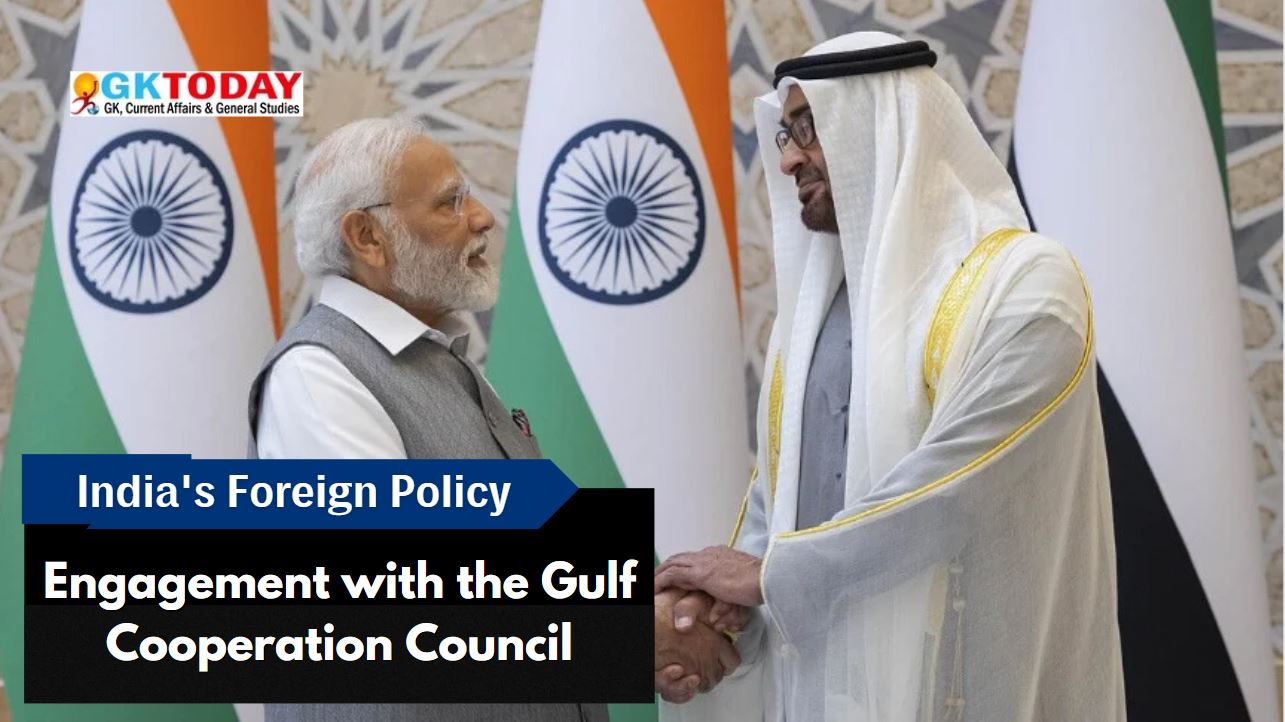India’s Foreign Policy – Engagement with the Gulf Cooperation Council (GCC)
India’s engagement with the Gulf Cooperation Council (GCC) is a vital aspect of its foreign policy, reflecting historical ties and strategic interests. Established in 1981, the GCC comprises six member states – Saudi Arabia, Kuwait, the United Arab Emirates (UAE), Qatar, Oman, and Bahrain. This regional bloc aims to encourage economic, political, and security cooperation among its members. India has developed a multifaceted relationship with the GCC, driven by economic interdependence, energy security, and cultural ties.
Introduction to Gulf Cooperation Council (GCC)
The GCC was formed to promote unity among its members.
- Member States – Saudi Arabia, Kuwait, UAE, Qatar, Oman, Bahrain.
- Objectives – Enhance economic cooperation, ensure political stability, and strengthen security collaboration.
- Significance – Acts as a strategic bloc in the Arab world and plays important role in global energy markets.
Historical Context of India-GCC Relations
India’s relationship with the Gulf region has deep historical roots.
- Cultural Exchanges – Trade routes established centuries ago facilitated cultural interactions.
- Indian Diaspora – Over 8 million Indians live in the GCC, forming part of the workforce.
- Economic Contributions – The diaspora contributes substantially to both the Indian and GCC economies.
Economic Relations
The GCC is one of India’s largest trading partners.
- Bilateral Trade – Reached approximately $162 billion in 2020-21.
- Exports – Major exports include petroleum products, machinery, textiles, and agricultural goods.
- Imports – India imports crude oil, natural gas, and petrochemicals from the GCC.
- Investment – GCC nations invest heavily in India’s infrastructure, real estate, and energy sectors.
Energy Security
Energy security is a mainstay of India-GCC relations.
- Oil Dependency – India imports about 85% of its crude oil from the Gulf region.
- Strategic Partnerships – Joint ventures in oil and gas exploration enhance energy cooperation.
- Renewable Energy – Growing interest in renewable energy initiatives and sustainability projects.
Political and Strategic Engagement
India’s “Look West” policy is very important in strengthening ties with the GCC.
- High-Level Visits – Regular dialogues between Indian leaders and GCC counterparts encourage cooperation.
- Counter-Terrorism – Collaborative efforts in combating terrorism and ensuring regional stability.
- Maritime Security – Joint initiatives to safeguard maritime routes crucial for trade.
Cultural and Social Ties
Cultural connections enrich India-GCC relations.
- Expatriate Community – The large Indian diaspora engages in cultural and social initiatives.
- Cultural Exchanges – Festivals, educational programs, and community initiatives promote Indian culture.
- Heritage Promotion – Indian heritage is showcased through various cultural platforms in the Gulf.
Security Cooperation
Security collaboration is essential for regional stability.
- Military Exercises – Joint military drills enhance preparedness and cooperation.
- Defense Dialogues – Ongoing discussions on security issues and strategies to combat extremism.
- Regional Frameworks – Active participation in regional security initiatives and frameworks.
Recent Developments
Recent geopolitical shifts have influenced India-GCC relations.
- Abraham Accords – India’s role in the normalisation of relations between Israel and some GCC states.
- Post-COVID Cooperation – Increased collaboration in technology, digital economy, and health sectors.
- Sustainable Development – Focus on climate change initiatives and sustainable practices.
Challenges in India-GCC Relations
Despite strong ties, challenges persist in the relationship.
- Geopolitical Tensions – Ongoing rivalries, particularly between Iran and Saudi Arabia, impact relations.
- Domestic Politics – Internal political dynamics in GCC countries can affect bilateral ties.
- Labour Rights – Issues related to the welfare and rights of Indian expatriates remain a concern.
Future Prospects
The future of India-GCC relations appears promising.
- Renewable Energy Cooperation – Potential for collaboration in renewable energy technologies.
- Trade Agreements – Strengthening of economic partnerships and trade agreements is anticipated.
- Regional Stability – Continued focus on security collaboration and regional stability initiatives.


